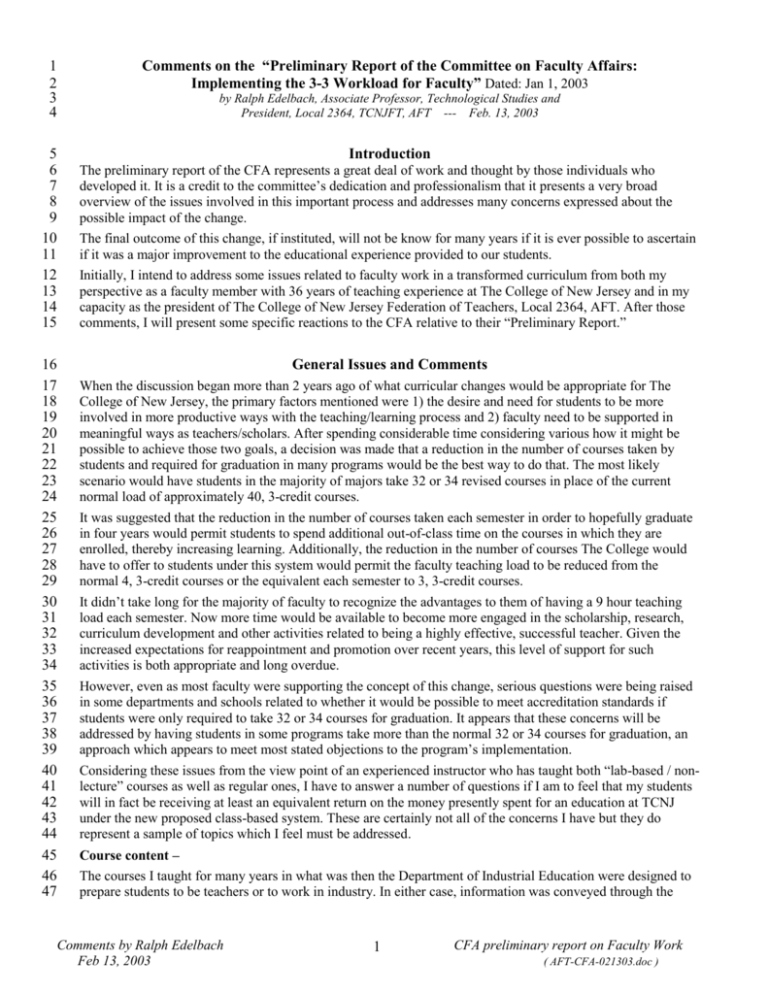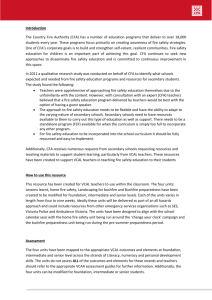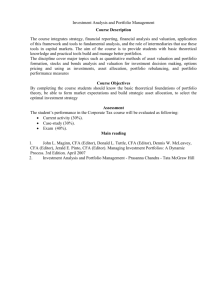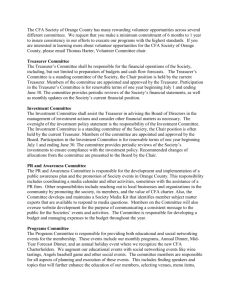Stephen Briggs, Provost December 17, 2001
advertisement

Comments on the “Preliminary Report of the Committee on Faculty Affairs: Implementing the 3-3 Workload for Faculty” Dated: Jan 1, 2003 1 2 3 4 5 6 7 8 9 10 11 12 13 14 15 by Ralph Edelbach, Associate Professor, Technological Studies and President, Local 2364, TCNJFT, AFT --- Feb. 13, 2003 Introduction The preliminary report of the CFA represents a great deal of work and thought by those individuals who developed it. It is a credit to the committee’s dedication and professionalism that it presents a very broad overview of the issues involved in this important process and addresses many concerns expressed about the possible impact of the change. The final outcome of this change, if instituted, will not be know for many years if it is ever possible to ascertain if it was a major improvement to the educational experience provided to our students. 16 17 18 19 20 21 22 23 24 25 26 27 28 29 30 31 32 33 34 35 36 37 38 39 40 41 42 43 44 45 46 47 Initially, I intend to address some issues related to faculty work in a transformed curriculum from both my perspective as a faculty member with 36 years of teaching experience at The College of New Jersey and in my capacity as the president of The College of New Jersey Federation of Teachers, Local 2364, AFT. After those comments, I will present some specific reactions to the CFA relative to their “Preliminary Report.” General Issues and Comments When the discussion began more than 2 years ago of what curricular changes would be appropriate for The College of New Jersey, the primary factors mentioned were 1) the desire and need for students to be more involved in more productive ways with the teaching/learning process and 2) faculty need to be supported in meaningful ways as teachers/scholars. After spending considerable time considering various how it might be possible to achieve those two goals, a decision was made that a reduction in the number of courses taken by students and required for graduation in many programs would be the best way to do that. The most likely scenario would have students in the majority of majors take 32 or 34 revised courses in place of the current normal load of approximately 40, 3-credit courses. It was suggested that the reduction in the number of courses taken each semester in order to hopefully graduate in four years would permit students to spend additional out-of-class time on the courses in which they are enrolled, thereby increasing learning. Additionally, the reduction in the number of courses The College would have to offer to students under this system would permit the faculty teaching load to be reduced from the normal 4, 3-credit courses or the equivalent each semester to 3, 3-credit courses. It didn’t take long for the majority of faculty to recognize the advantages to them of having a 9 hour teaching load each semester. Now more time would be available to become more engaged in the scholarship, research, curriculum development and other activities related to being a highly effective, successful teacher. Given the increased expectations for reappointment and promotion over recent years, this level of support for such activities is both appropriate and long overdue. However, even as most faculty were supporting the concept of this change, serious questions were being raised in some departments and schools related to whether it would be possible to meet accreditation standards if students were only required to take 32 or 34 courses for graduation. It appears that these concerns will be addressed by having students in some programs take more than the normal 32 or 34 courses for graduation, an approach which appears to meet most stated objections to the program’s implementation. Considering these issues from the view point of an experienced instructor who has taught both “lab-based / nonlecture” courses as well as regular ones, I have to answer a number of questions if I am to feel that my students will in fact be receiving at least an equivalent return on the money presently spent for an education at TCNJ under the new proposed class-based system. These are certainly not all of the concerns I have but they do represent a sample of topics which I feel must be addressed. Course content – The courses I taught for many years in what was then the Department of Industrial Education were designed to prepare students to be teachers or to work in industry. In either case, information was conveyed through the Comments by Ralph Edelbach Feb 13, 2003 1 CFA preliminary report on Faculty Work ( AFT-CFA-021303.doc ) 48 49 50 51 52 53 54 55 56 57 58 59 60 61 62 63 64 65 66 67 68 69 70 71 72 73 74 75 76 77 78 79 80 81 82 83 84 85 86 87 88 89 90 91 92 93 94 95 96 lecture/discussion method or various types of laboratory activities. Were I teaching courses of that nature today where students were required to take advanced courses in that or a related area, I would be concerned that there would not be sufficient time, given the reduced number of courses students would take in the proposed system, to cover the required information and develop the requisite level of skills. This would be even more problematic if the program of which the courses I taught were a part, had to meet external accreditation standards, In the case of general education courses such as Society, Ethics, and Technology which I have taught and coordinated for the past 8 years, there is no specifically-identified body of knowledge on which future required courses depend and the concerns previously expressed do not apply in the normal sense. However, if the goals and objectives for The College and general education are valid, we do need to consider whether the intention is to eliminate material from an existing course or attempt to include any additional information which should be included in the course by assigning out-of-class work to students, either as individual or group projects. This would be necessary if some classes had been eliminated due to the reduction from 40 to 32/34 courses. Naturally, the issue of how to encourage students to be more engaged and involved in their educational experience that has been often mentioned in our transformative curricular change discussions is another matter. Good teaching practices are of concern to all faculty and it is appropriate that The College has indicated a willingness to provide more support for continual upgrading teaching quality by establishing a Center for the Enhancement of Instruction. Whether the content of a program which can no longer be included in a reduced-course system is eliminated or covered through out-of-class assignments is an important consideration. Will this decision be left up to individual faculty members or if not, what individual or group will be charged with the responsibility to insure that this is accomplished? A Faculty Senate document dated October 2, 2001 states, “a review of redesigned courses will be conducted, either by the department or the school, and will likely occur over the initial two- to three-year period during which the new system is in place.” If that happens, what guidelines will be provided to faculty to help insure that the changes they make to their courses will be effective and judged to be appropriate during the evaluation phase of this process? Level of Faculty Work In this portion of my comments I would like to discuss possible impacts the transformative change being discussed might have on the level of faculty work if is implemented. There is widespread agreement that the faculty teaching load at TCNJ is in excess of other institutions with which we compare ourselves. The new system will reduce the number of classes faculty members are required to teach each semester. Class size is not supposed to increase under this system and therefore, faculty will have contact with fewer students in a normal semester. This should, theoretically, result in a reduced work load for each faculty member permitting more time for research, scholarship and/or other professional activities. While this seems to be a straightforward solution to the problem a too-heavy teaching load imposes, many have expressed concern that the new “intensified” and “more rigorous” courses well might require more time and effort compared with current “normal” classes. Some have even suggested that this increased level of work for the new 3-course teaching load could exceed what is typically required at the present time to teach the 4 “normal” courses. That would obviously be counter to what is being used as one of the primarily rationales for this change and all the work it has involved so far. Although many of the original questions concerning the operation of this new structure have been answered and solutions developed, a number of issues relating to faculty work remain. Drawing on communications from both the Faculty Senate and Provost Briggs, I would like to outline a few concerns in the hope that the final report of the Committee on Faculty Affairs will address them. Issue # 1 What are the explicit expectations of faculty related to both designing new courses which “engage students in earnest reading, writing, discussion, and preparation apart from the hours in class” and conducting classes which employ those practices? Questions have been raised concerning whether the administration plans on monitoring the extent to which faculty carry through on their stated goals and objectives. Comments by Ralph Edelbach Feb 13, 2003 2 CFA preliminary report on Faculty Work ( AFT-CFA-021303.doc ) ”Thus, the most important use of in-class time is not to convey information but to probe, challenge, and clarify students’ developing conceptual structures.” Briggs, August 30, 2001 97 98 99 100 101 102 103 104 105 106 107 108 109 110 111 112 113 114 115 116 117 118 119 120 121 122 123 124 125 126 127 128 129 130 131 132 ”The new system of work must be explicit regarding the expectations that faculty have of one another, including those that are not counted as part of the 24-hour load.” Briggs, August 30, 2001 “ ”Under the normal 3 + 3 faculty work assignment, a process of accountability will be employed to ensure that the agreed upon expectations of faculty as expressed in the General Expectations for Faculty Work at TCNJ document are being met.” Faculty Senate, October 2, 2001 “I am confident, therefore, that faculty within the schools can help foster a “culture of learning” that will require students to commit two to three hours outside of class reading, writing, discussing, and preparing for every hour in class.” Briggs, December 17, 2001 Issue # 2 Who will ultimately decide whether an “intensified” course is sufficiently rigorous and if it is deemed to be inadequate, what mechanism will be employed to insure that it is brought up to the required level? “A review of redesigned courses will be conducted, either by the department or the school, and will likely occur over the initial two- to three-year period during which the new system is in place.” Faculty Senate, October2, 2001 Issue # 3 – While one of the primary objectives of the transformed curriculum is to permit faculty to devote additional time to scholarship and research, how reasonable is it to expect that teaching an “intensified” course will not take more faculty time than teaching a current 3 credit course especially if more writing assignments are given to students? “A large majority of students say they learn significantly more in courses that are highly structured, with many quizzes and short assignments. Crucial to this preference is getting quick feedback from the professor.” Stephen Briggs, Provost December 17, 2001 Assessment / Evaluation There has been little mention or discussion of how the ultimate effectiveness of the proposed curriculum transformation will be determined. While the goals of providing a “learner-centered” educational experience for our students is commendable, it has been suggested that clearly stated goals need to be formulated, discussed, and agreed upon before any wholesale change is made. Many faculty on our campus have had extensive research experience and their expertise should be utilized now to establish realistic goals for a transformed curriculum as well as the process to be followed in determining whether those goals are achieved. Through a formative evaluation process it will be possible to make necessary adjustments in order to insure that we are providing the best education possible to our students and meeting other objectives as well. Specific Recommendations concerning the preliminary CFA report – 133 134 135 136 137 138 139 140 141 ( “line numbers” refer to line numbers on the attached CFA document ) Below are my primary concerns about the preliminary report of the CFA. Generally they are minor and I am willing to discuss any of them in more details if the committee would like further input. 1. In the final report, refer to the fact that all “terms and conditions of employment” MUST be negotiated with Local 2364, the official representative of The Council of New Jersey State College Locals (The Council) on the TCNJ campus. This includes differential weighting of courses. ( lines 29 thru 33 and 92 thru 160 ) Comments by Ralph Edelbach Feb 13, 2003 3 CFA preliminary report on Faculty Work ( AFT-CFA-021303.doc ) 2. In all cases where the term “release, released or reassigned” time is used in the preliminary CFA document, substitute the phrase “alternate assignment” in order to be consistent with The Agreement between The State and The Council. ( line 35 ) 142 143 144 145 146 147 148 149 150 151 152 153 154 155 156 157 158 159 160 161 162 163 164 165 166 167 168 169 170 171 172 173 174 175 176 177 178 179 180 181 182 183 3. Do not use the term “in consultation” to refer to any discussions between The College and The Local in order to avoid confusion and possible future complications. ( line 80 ) 4. Normally, when referring to the contract between The State and the AFT, the term “The Agreement” is used. ( line 180 ) 5. Mention the funds distributed through the Career Development Process as another way of supporting the professional objectives of both faculty and professional staff unit members. ( line 206 ) 6. Carefully consider the use of the word “shall” which normally is construed as meaning the action is required. “Should” is normally the appropriate term in a non-legal document such as this report. ( line 224 ) 7. Consider situations where it might not be possible for a full-time faculty member to teach at least one course a year. What undue pressure might such a requirement put on a department chair or a faculty member? Have there been faculty in the past who did not teach at least one course a year and if so, has that created a problem? ( line 243 ) 8. Address the issue of how the 12 FTE SOSA faculty lines which the Provost specified would exist under the new system compares with what exists for SOSA today? If there is a difference, what impact might that have on faculty productivity and/or morale? ( lines 312 and 421 ) 9. There should be ample opportunity for faculty input into the process which determines the alternate assignment time for administrative responsibilities normally fulfilled by faculty members. The ultimate decision should reflect a decision which is agreeable to both parties rather than one made by “the appropriate academic officer” (lines 394 thru 408 ) 10. While The Contract stipulates that faculty who receive a sabbatical leave with be paid ¾ pay for a onesemester leave and ½ pay for a full-year leave, that has been interpreted as the minimum compensation, not the maximum. Although The Local would certainly support a change such as suggested by the CFA, this must be formally negotiated between The College and The Local ( lines 435 thru 438 ) 11. While the transformed curriculum is primarily being planned by full-time faculty, adjunct faculty play an important role in our instructional program and will, in all likelihood, continue to do so. Therefore, it is important that this group be recognized as making contributions where appropriate. Such an instance is in the area of the development of courses ( line 507 ). Some mention of the role played by adjunct faculty would be appropriate at this point. 12. Mentoring of both new faculty and adjunct faculty by full-time faculty is something which is deservedly addressed in this report. However, how this potentially-valuable process is structured and recognized is an important issue. Since this report recommends compensation for this process, it is necessary that it be negotiated with The Local. ( lines 518 thru 524 ) 13. Any review of the workload of librarians which leads to an adjustment must be negotiated with The Local. ( line 553 ) 14. There should be some mention of the need for and importance of a Center for Instructional Enhancement on campus. The Administration has publicly acknowledged the importance of such a program and the intention of establishing such a facility and if it were included in the final CFA report, its importance would be reinforced. Comments by Ralph Edelbach Feb 13, 2003 4 CFA preliminary report on Faculty Work ( AFT-CFA-021303.doc )






